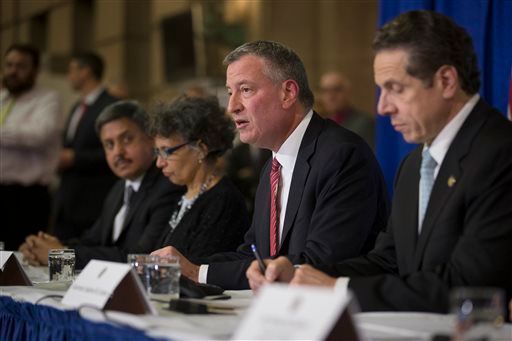
By Joseph Vitale
Fordham University Student Health Services on Monday echoed the Center for Disease Control’s effort to quell a concerned public about the dangers of the Ebola virus by barring students, faculty and staff from traveling to the West African region where outbreaks have occurred in recent months.
The university characterized the travel restriction to the three countries in the region—which includes Sierra Leone, Liberia and Guinea—as acting with “an abundance of caution,” according to an email sent to the Fordham community. The guidelines additionally advise students traveling to, or hosting international guests from, affected areas to immediately contact the University Health Center.
Reflective of the CDC’s most recent set of guidelines, Fordham’s selective travel ban provides an added layer of caution following the guidelines released in August, which instructed any students, faculty or staff members who had recently visited affected areas (which then included Nigeria) to contact the health center before returning to Fordham in the fall.
While the CDC says the number of infected areas “may change rapidly,” Fordham continues to require any member of the community who recently visited the affected regions to contact the university health center if they believe they are at risk of exposure.
As of this week, there have been more than 10,000 confirmed cases of Ebola around the world since the outbreak began in July. Concentrated in a handful of West African countries, the disease, which is transmitted through direct contact with bodily fluids, has taken the lives of close to 5,000 people, including hundreds of medical and aid workers from around the world.
The result has been a politically embroiled crisis, bringing into question international cooperation, emergency medical responses and ethical treatment of infected patients.
The university-wide update follows just one confirmed case in New York City, which left city residents fearful following reports that the patient, a young doctor who had recently returned from working in Guinea, traveled by subway and attended a concert in Brooklyn.
The proximity of the confirmed case has brought even louder calls for locally coordinated preventative measures.
While some maintain that there is a surge in hysteria and a lack of composure, Fordham students welcome the travel bans given that they protect the community and minimize the risks of the disease spreading in the country.
“The Ebola Crisis, as it is being referred to, is still something that needs to be addressed and dealt with,” Lincoln Zernicke, FCRH ’16, a pre-health student and 1st Lieutenant of FUEMS, said. “Until we have an accepted and recognized treatment we should be cautious by following suit with the CDC and New York State policy by barring students from studying in these countries, effectively eliminating the small chance that they could get the virus.”
“Thus, this overreaction has made us more ready for the small possibility of an outbreak and now, more then ever, we are prepared for such an event,” Zernicke added.
Given the uncertainty of the situation, some students are in favor of preventative measures that may appear to be nearing extremes. While the risk of contamination is low, foregoing on action can have deadly consequences.
“I think the measure is definitely necessary,” said Carolyn Allain, FCRH ’17. “This is a constantly evolving disease and everything we have tried so far has been futile. It has come to the point of necessary restrictions for the greater good.”
“The average American has chances of contracting the disease of slim to none, considering how it’s contracted. As long as people follow the guidelines that are required to prevent the spread, we will all be okay,” Allain added.
The CDC has a set number of recommendations to university health centers. It warns universities to advise students of the signs and symptoms of Ebola in patients who have a recent travel history to countries where the outbreak has occurred or if a person has been in contact with an individual infected with Ebola.
“Ebola is a serious threat, and allowing students to visit places greatly affected by the virus is an unnecessary risk,” said Peter Vergara, FCRH ’18, a USG senator. “I see great benefit in limiting travel to and from areas already affected by Ebola.”
In addition to Fordham’s guidelines, students are advised to consult the CDC’s guidelines for college students.
The CDC recommends that students avoid non-essential travel to Guinea, Liberia and Sierra Leone at this time, and postpone any education-related travel to countries where the disease has broken out.
In countries where there is an outbreak, it explains that a foreign government may enact measures such as quarantines, isolations and screening for travelers in order to protect its population, and that the American government has limited resources to intervene in their responses.
__________
Joseph Vitale is the Managing Editor for The Fordham Ram.








































































































































































































